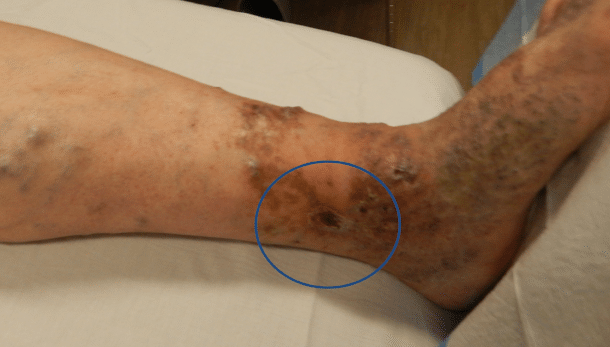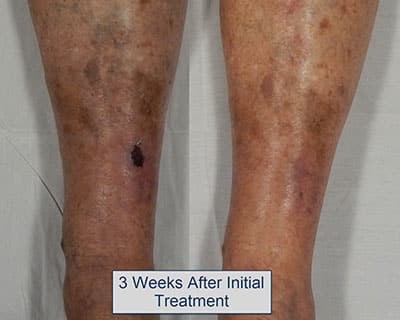Venous Leg Ulcers Symptoms, Causes, and Treatment
What are Venous Ulcers?
Venous leg ulcers – stasis ulcers, venous insufficiency ulceration, stasis dermatitis or ulcus cruris are chronic non-healing sores below the knee of the lower leg, ankle, or foot and are most commonly caused by chronic venous insufficiency (CVI). These ulcers are often associated with varicose veins, the improper functioning of venous valves. Other causes that are considered before we begin treatment include: diabetic foot ulcer, arteriosclerotic occlusions, an infection, or in a small percentage of patients, arterial disease. Venous ulcers of the lower legs affect 500,000 to 600,000 Americans each year.
When the one way valves in veins fail or leak, gravity causes blood to flow backwards (venous reflux) towards the feet and pool inside the veins. An inflammatory reaction occurs when significant chronic venous reflux is present, which in turn damages the tissues of the skin of the lower leg, ankle, and foot. Gradually the skin in the legs becomes malnourished and very fragile. With a minor trauma, as simple as a scratch or scrape, a non-healing sore develops. After a while, the small wound may enlarge and become deeper.

Patient Testimonial
"I had a severe leg ulcer that is no longer an issue thanks to the outstanding care I received. Truly a group of people that care about the process of my healing just as much as the necessary vein procedures. Ms. Rose personally has followed my situation from day-one with periodic "check-in" calls. I feel very spoiled and well taken care of. Rating: 5 out of 5"
Larry M.
Advanced Vein Institute Patient
Venous Leg Ulcer Symptoms
These leg ulcers are often very painful, messy, and difficult to heal using typical wound care measures; representative of the most severe form of venous disease. Venous ulcers are typically the result of venous insufficiency that has not been treated for years.
- Skin ulcers
- Open non-healing sores
- Hardened skin around the wound
- Fragile skin of legs, ankle, or foot
- Discoloration of skin - turning purple
- Itchy and inflamed skin
- Hardened skin around the wound
- Swelling legs
- Painful legs
- Aching Legs
Patient Testimonial

"I called to schedule an appointment to visit Dr Rose and the staff was very professional. I got an appointment within the week. Once there Dr. Rose was professional and knowledgeable. She treated my veins immediately and I could not be happier. I would highly recommend Dr. Rose, you will be very pleased with the outcome."
Leslie C. in Scottsdale, AZ
Advanced Vein Institute Patient
Venous Leg Ulcer Treatment
 Ulcer treatments are twofold: healing the existing wound and preventing a recurrence once it is healed. Identification and treatment of the underlying venous disease will speed the healing process and prevent the venous stasis ulcer from returning once it is healed. Good compression hose, elevation, and intensive wound care may be effective in achieving healing, but every now and again, the ulcer recurs, particularly if the patient does not maintain compression and if the underlying venous insufficiency is not treated.
Ulcer treatments are twofold: healing the existing wound and preventing a recurrence once it is healed. Identification and treatment of the underlying venous disease will speed the healing process and prevent the venous stasis ulcer from returning once it is healed. Good compression hose, elevation, and intensive wound care may be effective in achieving healing, but every now and again, the ulcer recurs, particularly if the patient does not maintain compression and if the underlying venous insufficiency is not treated.
Venous ulcers have serious complications including scarring, severe infection, and even loss of limb. Typically, a venous leg ulcer takes six months to heal. Early treatment of chronic venous insufficiency may help avoid this situation before an ulcer develops.
With minimally invasive vein ablation procedures, Dr. Rose is able to cure over 90% of chronic venous ulcers and prevent recurrence of future leg ulcers. These results are far superior to those obtained from painful and invasive vein stripping procedures performed in the past.
Next Steps for Ulcer Evaluation
Sometimes the venous leg ulcer becomes so large that muscle is eroded or a bone infection is present. In these cases, a multidisciplinary coordination of treatment is carried out with wound care specialists, podiatrists, and plastic surgeons in order to heal the most serious leg wounds from venous ulcers.
Are you ready to get started?
Not Quite Ready?
Why not read what other patients have said, we love to share feedback!


